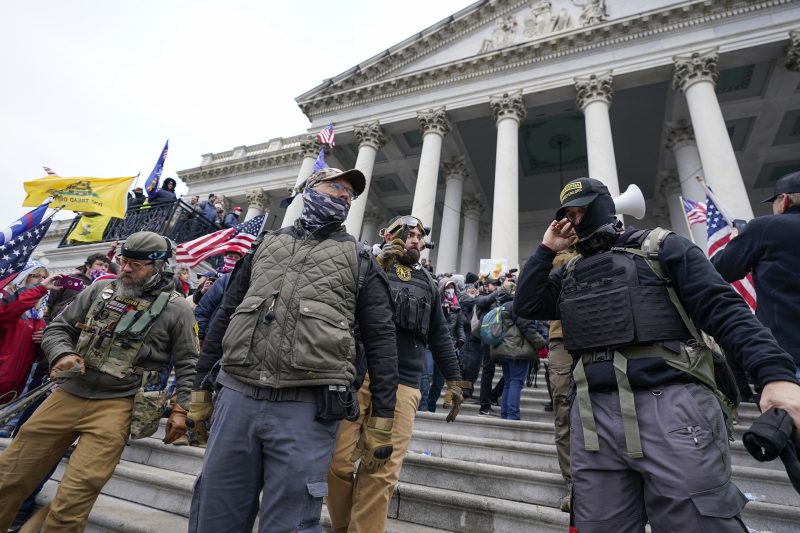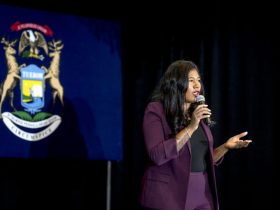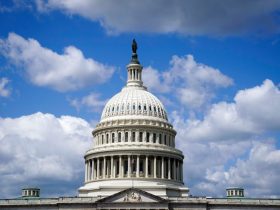U.S. prosecutors on Monday tied four more members of the Oath Keepers to leader Stewart Rhodes, beginning a second seditious conspiracy trial of the Jan. 6, 2021, attack on the Capitol by telling jurors that each was in direct contact with Rhodes and his calls for an armed “civil war” to keep Donald Trump in power.
Assistant U.S. Attorney Troy Edwards said in opening statements that on Jan. 6, the defendants accepted Rhodes’s “invitation to sedition” and “perverted the constitutional order” by trying “to stop the peaceful transfer of power by force for the first time in our country’s history.”
“They were willing to use force and violence to impose their view of law and order and their view of constitutional order on the rest of the country,” Edwards told a jury in federal court in Washington.
Edwards said the defendants — Roberto Minuta, 37; Joseph B. Hackett, 52; David Moerschel, 44; and Edward Vallejo, 64 — said they were at war with the U.S. government and “energized” rioters after preparing for “their revolutionary war.”
Attorneys for defendants criticized the Justice Department for a “rush to judgment.” The attorneys said prosecutors had cherry-picked “bombastic” fragments of conversations over months and lumped defendants who barely knew each other, if at all, in a grossly oversimplified, “incomplete and warped” story.
“These people had Twitter fingers, not trigger fingers,” said Moerschel attorney Scott Weinberg, ridiculing the government’s depiction of defendants as armed militants threatening democracy and paraphrasing rap artist Drake.
Weinberg said the Oath Keepers was headed by an “incompetent” and manipulative “right-wing televangelist” in Rhodes, who lives off members’ $50 dues and sought “to ride in Trump’s wake to get as much publicity as he could.”
“This was not some highly organized group. It was really a bunch of people that were out of shape, overweight, elderly and who wanted to play military,” Weinberg said.
Hackett attorney Angela Halim agreed. She asked her client to stand for the jury — a chiropractor from Sarasota, Fla., who wore a tie, V-neck sweater and glasses perched atop his forehead.
“The government has been in overdrive manipulating evidence to show there was a shared goal, a unity of purpose, a meeting of the minds of all these people from all over the country. There was not.”
All four men are accused like Rhodes of stockpiling an arsenal of firearms in nearby Virginia, converging on the Capitol in military-style gear, and conspiring to oppose by force the swearing-in of President Biden. They are also charged with conspiring to impede lawmakers and obstructing Congress’s confirmation of the 2020 election results.
The seditious conspiracy trial is the second of three from the Capitol siege to unfold blocks from the rioting. On Nov. 29, a jury convicted Rhodes and Florida Oath Keepers “state lead” Kelly Meggs of plotting to oppose federal authority by force after a two-month trial. Three additional co-defendants were convicted of other felony charges similarly punishable by up to 20 years in prison. A third trial will begin jury selection next week with former Proud Boys chairman Henry “Enrique” Tarrio and other leaders of his far-right group facing similar charges.
The trial that started Monday presents both a tougher challenge and lower stakes for prosecutors than the first, legal analysts said.
On one hand, a federal jury of D.C. residents has already endorsed the government’s case: Rhodes drew and a top deputy led followers in combat-style gear to the Capitol ready to take up arms against U.S. authorities and attack a “bedrock of democracy,” the peaceful transfer of presidential power.
What to know about the Oath Keepers sedition trial
He is accused of guiding a months-long effort to unleash politically motivated violence to prevent the swearing-in of President Biden.
Rhodes is the most high-profile person charged in the investigation so far.
Prosecutors will try to convince jurors that Rhodes and his group intentionally conspired to use force to prevent President Biden’s swearing-in.
The trial is an important step in the wider probe, analysts say.
1/2
End of carousel
But jurors acquitted three subordinates of the seditious conspiracy count while convicting them of conspiring to and actually obstructing Congress, previewing how jurors might view defendants whose actions and communications were more limited than those of their purported leader.
Both sides are expected to hone their arguments in trial learning lessons from the first. Prosecutors have signaled they will slim down their case by trimming hundreds of exhibits.
Meanwhile, defense attorneys on Monday repeated Rhodes’s and co-conspirators’ claims at the earlier trial that there was no plan to attack the Capitol, no plan to attack the electoral college process.
“And there certainly was no plan to oppose the authority of the U.S. government by force,” Halim said.
Instead, they argued that errors and gaps in the purported U.S. timeline of events corroborate Rhodes’s testimony that Oath Keepers who breached the Capitol did so spontaneously and were concerned with opposing Biden in office, not preventing his inauguration.
Prosecutors say Hackett and Moerschel are among Florida Oath Keepers who began joining Rhodes as early as Nov. 9, 2020, to start planning to oppose Biden’s inauguration. They eventually traveled to D.C. and entered the Capitol on Jan. 6 — led by Meggs in a military-style, single-file formation after staging firearms for a “Quick Reaction Force” at their hotel just outside Washington, prosecutors allege.
In planning for Jan. 6, Hackett urged other members of the group to use anonymous and untraceable communications, and took part in firearms training with Moerschel and Meggs, prosecutors said.
Moerschel is also accused of confronting police and searching with others inside the Capitol for House Speaker Nancy Pelosi (D-Calif). His lawyer later turned over to the FBI a flack vest, jacket, duffel bag, rifle case and a firearm that investigators allege he took to Washington.
According to the indictment, Minuta — a New Jersey tattoo parlor owner — coordinated with Rhodes. Minuta also helped lead a second group of Oath Keepers while equipped with ballistic goggles, hard knuckle tactical gloves, a radio and bear spray, before entering and angrily confronting police in the Capitol Rotunda, prosecutors allege. Members of both groups spent the morning guarding Trump confidant Roger Stone and a relative of “Stop the Steal” organizer Ali Alexander, both sides said.
Minuta is also accused of being on an Oath Keepers leadership chat group Rhodes messaged on Dec. 12, 2020. Rhodes allegedly wrote that if Trump did not invoke the Insurrection Act to call out private militia to stay in power, “then we will have to fight against an illegitimate Biden regime. It will be a bloody and desperate fight. We are going to have a fight. That can’t be avoided.”
Vallejo, who like Rhodes did not enter the building, stayed at the Ballston Comfort Inn in Arlington on Jan. 6 where he allegedly oversaw the weapons and ammunition and awaited orders to bring them to Washington, the government alleges. That morning, Vallejo on a podcast predicted “guerrilla war” if Congress rejected Trump’s demands. That afternoon, he messaged Rhodes as Oath Keepers breached the building, Edward told jurors, “QRF standing by at hotel. Just say the word.”
In addition to the three main conspiracy counts and obstructing Congress, Hackett and Moerschel are charged with damaging the Capitol’s East Rotunda doors through which they allegedly entered. They and Minuta are also accused of deleting evidence.
Rhodes’s defense said he and co-defendants came to Washington as bodyguards and peacekeepers, bringing firearms only in case Trump met their demand to mobilize private militia to stop Biden from becoming president. While defendants may have engaged in “horribly headed rhetoric and bombast,” their venting was constitutionally protected speech and not an illegal conspiracy to violently oppose the government.
On Monday, attorneys for Hackett, Moerschel and Vallejo similarly cast their clients as bit players with differing motivations. Minuta attorney William Shipley reserved his right to address jurors later in trial, which is expected to last four weeks.
For example, Vallejo attorney Matthew Peed noted his client drove to D.C. from Arizona hauling 200 pounds of food, expecting to join others at a campground for an “Occupy Wall Street” protest.
Peed told jurors that far from menacing, members of the Oath Keepers group in general and his client in particular were somewhat hapless — one wound up avoiding charges because he needed to use a restroom when the others moved up the Capitol steps. Vallejo did not go to the Capitol because he lost his truck downtown on Jan. 5.
“The man who was supposed to be a threat to democracy … lost his truck,” Peed said.
Peed told jurors he knew the case was historic but told them it was actually four cases.
“We all want justice for that day. We want the law to be respected. We want the vindication of the American tradition,” Peed said. But “each individual at the table behind me charged in their case has a different set of circumstances. In many ways, the only thing uniting them is the government’s theory and the desire to try them together.”








